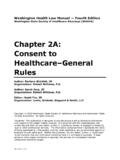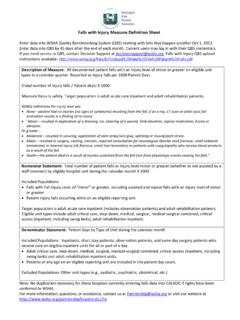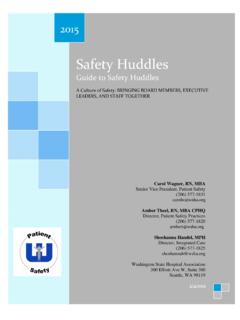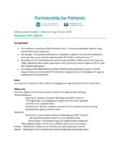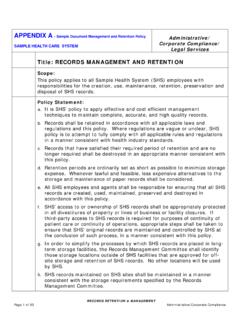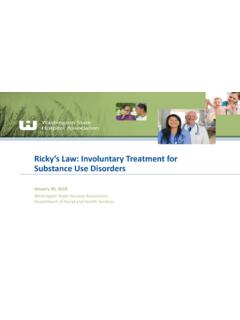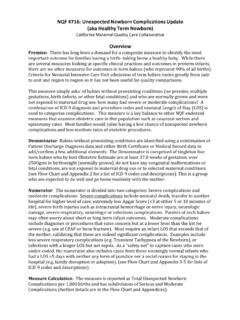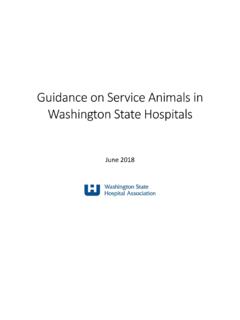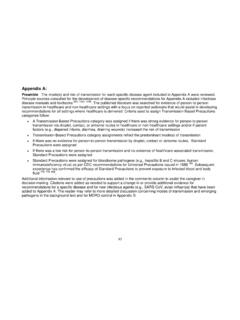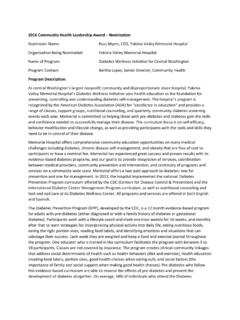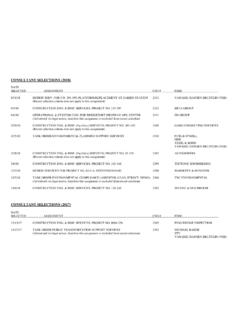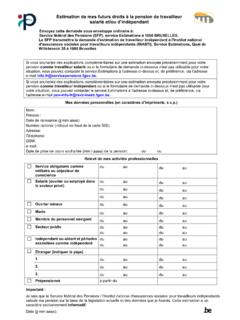Transcription of November 9, 2017 Revised HCA Provider …
1 November 9, 2017 Revised HCA Provider preventable Readmissions (PPR) policy A readmission is defined as a hospital admission which occurs within 14 days of discharge from a prior (index) admission and is clinically related to the index admission. A readmission is considered to be preventable if there was a reasonable expectation that it could have been prevented by one or more of the following: The provision of quality care in the index hospitalization (a specific quality concern, knowable at the time of treatment, and resulting in the readmission , needs to be identified) Adequate discharge planning (as defined below under Provider responsibility ) Adequate post-discharge follow-up NOTE.
2 If issues with quality of care, discharge planning, or follow up occurred but cannot be reasonably considered the cause of the readmission , payment cannot be denied. If a readmission is determined to be Provider preventable , the HCA or MCO can deny payment for the readmission . Excluded from Provider preventable : readmission for reasons unrelated to conditions or care from index admission Planned readmissions, including but not limited to: Repetitive treatments such as cancer chemotherapy or other required treatments for cancer, transfusions for chronic anemia, burn therapy, dialysis or other planned treatments for renal failure, etc.
3 Planned therapeutic or procedural admissions following diagnostic admissions, when the therapeutic treatment clinically could not occur during the same case. Same-day planned admission to a different hospital unit for continuing care (can include mental health/CD transfers, rehab transfers, etc, which may be technically coded as discharge/admission for billing reasons) Required treatments for cancer including treatment-related toxicities, or care for advanced-stage cancer End of life and hospice care Patients who left AMA from index admission readmission due to patient nonadherence to the discharge plan, despite appropriate discharge planning and supports.
4 This also includes cases where the recommended discharge plan was refused by the patient, and a less appropriate alternative plan was made to accommodate patient preferences; this must be clearly documented in the record Obstetrical readmissions for birth after an antepartum admission Admissions with a primary diagnosis of mental health or SUD issue Neonatal readmissions Transplant readmissions within 180 days of transplant Readmissions when the index admission occurred in a different hospital system Provider responsibility on discharge: Discharge summary created including summary of diagnoses, care provided, medication list, and follow up plan.
5 Discharge plan should include home care instructions including dietary restrictions, physical limitations or limits on activity, wound care, self care, etc. Discharge summary sent to the patient s identified follow-up Provider . Discharge summary should be produced and sent in a timely enough manner to accommodate the patient s follow up needs ( , must be available for the follow up Provider at the time of scheduled follow up). Patient given all required prescriptions and educated on appropriate use of the medication(s). Discharge instructions provided, explained and given to patient prior to discharge, in a linguistically appropriate format.
6 If written instructions cannot be provided in the patient s language, there should be documentation that oral instructions were given by a translator and the patient s questions were fully addressed. Appropriate contact telephone numbers given to patient for calls for discharge related questions The following should, in general, be arranged by the Provider . o Follow up appointment scheduled in an appropriate time frame (typically 7 days) o DME as needed. o Placement and other relevant financial and social needs of patient identified, and efforts made to address these If, for the above three categories, barriers are encountered including access/availability, authorization, or payment, the Provider s responsibility is to clearly notify the MCO of these needs and barriers and partner with MCO staff to address these.
7 Provider must clearly document format and content of discussion with MCO (call, fax, etc), and clearly communicate the patient s needs. Voicemail without follow up would typically not be considered adequate notification. Requests from providers for assistance with addressing barriers to post-discharge care must be separately identifiable from general utilization management and medical records. Provider should notify MCO of planned discharge and anticipated needs sufficiently in advance of discharge to allow follow up needs to be arranged (typically 2 days), and provide documentation needed to support authorization.
8 If a readmission occurs because of a gap in care due to the MCO denying recommended follow up care, then payment cannot be denied for the readmission under this policy . Managed Care Appeal process: The managed care plans must offer at least a two level process for confirming the determination that the readmission was preventable under this policy . The first level would be a reconsideration request, followed by a more formal re-review. Contract Oversight and Dispute Resolution process: When the managed care organization and the hospital, or attending, are unable to agree on assignation of responsibility for the readmission and the utilization review appeal process available through the managed care plan has been exhausted, HCA will provide a review of the determination as part of their responsibility for contract oversight and compliance review.
9 The Provider may submit their position and supporting clinical documentation to HCA for review. HCA will make an inquiry of the plan s position and supporting documentation. HCA will make a final determination of assignment of responsibility based on all information submitted. In addition, the HCA will monitor MCO adherence to the policy via its contract monitoring and audit process. A hospital can trigger an HCA review of an MCO s PPR practices if there is concern for a pattern of inappropriate adjudication. ROLE OF PPR DATA AS PROVIDED BY NAVIGANT: 1.
10 Navigant will continue to provide PPR data to hospitals, including detailed claims data. This data will be used by hospitals to identify systems oriented approaches to reducing avoidable readmissions that are identified through analyzing this population-based data. 2. Hospitals will NO longer have rates adjusted based on a target PPR rate. Financial incentives to reduce avoidable re-admissions will instead flow through the 14-day re-admit policy described above. 3. HCA will work to make Navigant PPR data available to MCOs. Other: This policy applies only to hospital fees for inpatient admissions.
